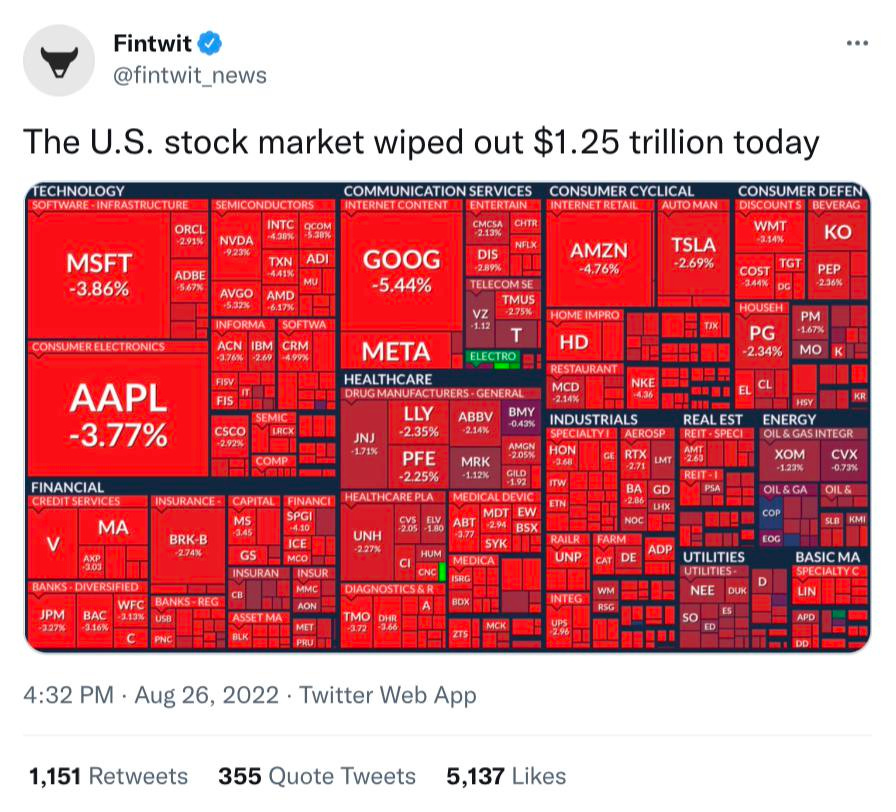What’s up you guys, it’s Graham here! If you want to join 17,000+ smart investors and never miss an update on the market, hit the subscribe button below. It only takes a second and it’s completely free.
If you recently finished paying off your student loans, you have my deepest sympathies. Last week, the White House announced an unprecedented student loan relief plan, which forgives up to $10,000 of student loans ($20,000 for Pell Grant recipients).
With the new student debt forgiveness plan expected to cost the average American taxpayer around $2,000, and an already existing tax gap of nearly $200 Billion, the government has turned to the IRS to bring in additional revenue.
Last week also saw Jerome Powell announce that the Fed plans to continue raising interest rates to bring down the four-decade high inflation. In an otherwise uneventful week for the S&P 500, his statement that the higher interest rates “will also bring some pain to households and businesses” caused the index to drop by nearly 3%.
Given that black Monday was trending on Twitter, you can place your bets for free here :)
The IRS gets an upgrade
The internal revenue services (or IRS) is about to receive a cash injection of $80 Billion, with the objective of increasing audit rates, strengthening enforcement, and replacing retiring staff. Treasury secretary Janet Yellen has tried to allay fears by saying that those earning under $400,000 have nothing to fear, however, $46 Billion of the proposed cash injection will go into hiring new enforcement agents, and folks who make more than $100,000 have seen their audit rates double this year.
In this video, I take a closer look at the problems plaguing the IRS, its declining enforcement rates, and how budget cuts have resulted in nearly 17 million Americans still waiting for their tax refund. I also describe in some detail how IRS audits work, the associated penalties for non-compliance, and provide guidance on how you can reduce your chances of being targeted by the dreaded tax audit - so make sure you don’t miss this one!
Housing Market Decline
Millennials have been waiting for a housing market decline since forever and we just might be there, with Zillow reporting falling home prices in 123 regional housing markets in the United States. Coupled with this, mortgage demand also fell substantially and the July data from the National Association of Realtors showed home sales falling by nearly 6 percent.
In my second video this week, I look at the recent news about the housing market and how prices have been softening due to lower competition. A close inspection of the data shows that there are a few key factors to be considered.
Inflation - Changes in nominal housing prices, when adjusted for inflation have decreased. For example, if Zillow predicts a 2.4% increase in housing prices and inflation is 7%, that means that housing prices fell by 4.6%.
Overvaluation - Data firms like Moody’s Analytics estimate that the housing market is overvalued by almost 24.7%, the highest it has been since the housing bubble.
Supply - On the supply side, low inventory is likely to continue as fewer homes are coming to the market when compared with levels prior to the pandemic. Additionally, the increasing building material costs (partly due to inflation) mean that an overall smaller number of homes are being built.
Demand - With interest rates nearly doubling in a year, mortgage demand has fallen to a 22-year low as the skyrocketing monthly payments have priced many middle-class families out of the housing market. The events have even spooked institutional investors like Blackstone, who announced that they will stop purchasing homes in 28 regional US markets.
Despite this, according to experts, we are more likely to see a real estate “cool down” rather than “collapse” with modest declines in housing prices. With the Fed still holding mortgage-backed securities and lots of buyers waiting on the sidelines, I too believe that we might not see a 2008-like crash. Real estate is a topic that’s always close to my heart and in this video, I describe some nuances to consider before purchasing a home right now and which regional housing markets are likely to see a decline in the recent future. Have a look and let me know your thoughts!
So that’s it for my Sunday round-up. For the new folks here, in this newsletter, I give a quick recap of whatever you may have missed over the week on Sunday, and on Wednesday, I will be doing my deep-dive article on one of these topics.
See you next week with another bunch of exciting videos!
And force of habit - Smash that like button to help others find this newsletter.





